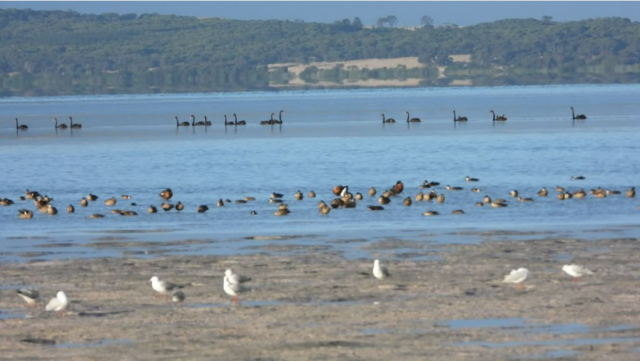OPENING day of duck hunting season at Lake George in Beachport attracted the attention of the RSPCA South Australia who have released a statement citing concerns about the actions of some hunters.
A group of 12 animal activists from Victoria and South Australia met at the lake to record hunter behaviour during the opening two days.
Adelaide based Kerri, who requested her full name be withheld, was one of those filming at sunrise and sunset.
“I went because I have an interest in the safety of animals and I’ve never actually seen it first hand,” she said.
“I had presumptions that the hunters would shoot a duck and it would die.
“I had heard statistics about one in four were injured with the presumption being the rest of them die instantly.”
However, she believed the statistic of injured birds was much higher.
The statement released by the RSPCA raised several concerns, including allowing dogs to play with wounded ducks before moving to retrieve them, and twirling ducks around with the birds flapping for some time before dying.
Some of these instances were captured on video and released to media.
Field and Game Australia CEO Lucas Cooke addressed claims made in the RSPCA media release.
Responding to the retriever dog shown in the video, Mr Cooke said the duck was diving under the water.
“It takes the dog a few attempts to locate and pick up the duck, then he gently carries it back,” Mr Cooke said.
“He’s not chewing on it or maiming that bird.
“It is exactly why having a dog is an effective retrieval strategy because that dog gets hold of that bird better and quicker than a person probably could.
Mr Cooke also addressed concerns the birds are not dead after being twirled due to the flapping of the wings.
“It has been established once you have broken the duck’s neck, it is dead.
“Quite often the wing flapping will commence once the duck’s neck is broken which is a normal nervous response in a dead bird.”
However, Mr Cooke stated the twirling or helicoptering technique is not the preferred method used to dispatch wounded birds.
The DEW code of practice states that injured birds must be killed as quickly and humanely as possible by a second shot, or a blow with a heavy instrument to the rear of the skull (the bird should be either restrained or immobile).
This method of dispatching wounded birds varies from Victoria with Mr Cooke stating their organisation would encourage hunters to quickly perform a cervical dislocation which is the recommendation in that state.
“We encourage hunters to be educated and know and practice the right ways to dispatch birds as quickly possible.
“We wouldn’t encourage the windmill approach but at the same time we stop short of saying that guy has done anything wrong, he just hasn’t done it the most effective way he could’ve.
“I find it difficult that SA would not allow you to dispatch a bird in the way that Victoria insists you must.
“If the updated version of the SA requirement are to do it that way then we will probably need to take that on notice and educate our hunters.
“There would be multiple Victorian hunters that have hunted for years and know how to administer a cervical dislocation and would do that as the proven quickest way to dispatch a duck.”
RSPCA South Australia’s objection to duck hunting is the inevitable and often extreme suffering it causes.
The RSPCA South Australia and Australian Veterinary Association (AVA) have both come out against recreational duck hunting.
They cite high wounding rates and disruption caused to nesting species due to the noise and movement of shooters through their habitats as major concerns.
In a statement released last month, the AVA said wing, bill and leg fractures are common in surviving birds.
“If left, wounded birds can suffer from the disabling effects of the injury, including pain and infection or thirst and starvation if unable to drink or eat,” it said.
“All of these increase the likelihood of being taken by a predator.”
RSPCA SA’s Animal Welfare Advocate Dr Rebekah Eyers said that when two peak animal welfare bodies, the RSPCA and the Australian Veterinary Association, are both opposed to an activity that causes needless suffering to so many native animals and birds, something has to change.
“Our state’s native birds are protected species, it’s truly shocking that we remove that protection for four months a year to let shooters into their habitats,” she said.
In a statement received from the DEW it was stated they will take action against any hunters breaking the law and take breaches of permits and regulations seriously.
The DEW encourage anyone with footage to contact them directly to assist with investigation of potential breaches.
Each year the department investigates a small number of potential breaches.
The most recent prosecution was for an incident in the 2021 hunting season resulting in a person being found guilty of breaching permit conditions and their firearm being confiscated.
Breaches can result in either cautions, expiations or prosecution depending on type and severity of the offence.
Western Australia, NSW and Queensland have already banned duck hunting and the Victorian Government introduced a shorter season this year.
South Australia, Victoria, Tasmania and the Northern Territory are the only states and territories still allowing the activity.
The ongoing opposition to opening wetland habitats to shooters has triggered State Government inquiries in both South Australia and Victoria, to review the laws.








